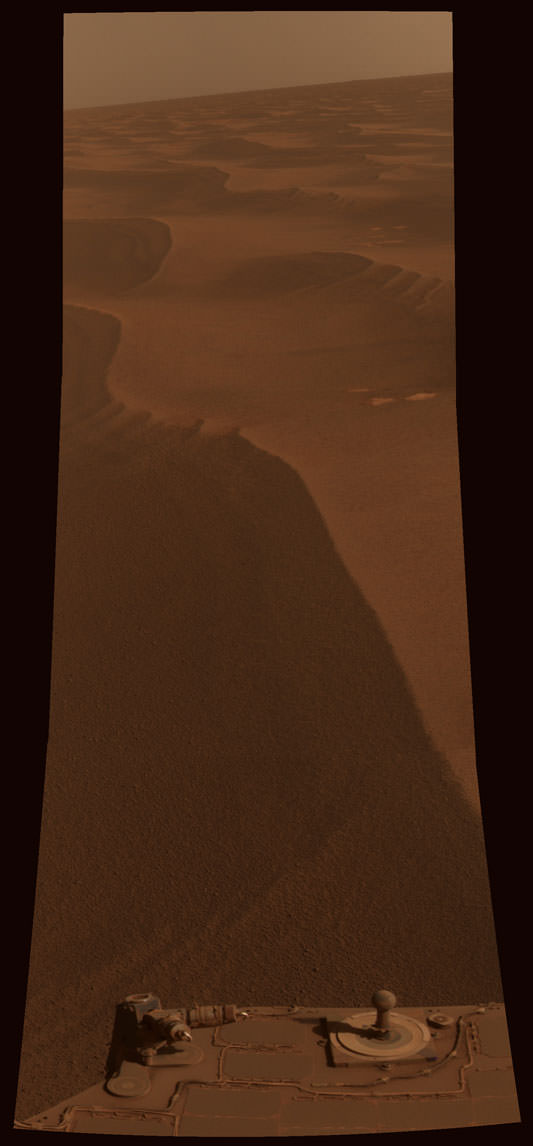[/caption]
The New York Times Lens Blog came up with a great idea: They called it “A Moment in Time,” and asked people everywhere to take a picture on May 2, 2010 15:00 UTC and submit it, to share the variety and complexity of life on our world. Emily Lakdawalla from the Planetary Society saw this and thought, “Why limit it to Earth?” she wrote on the Planetary Blog. “What about Mars? What will Opportunity be doing at 15:00 U.T.C. on May 2?” Emily approached Jim Bell, planetary scientist at Cornell University and lead for the rovers’ Pancam team, who was immediately enthusiastic about the idea of having Opportunity take an image to submit to the “Moment in Time” project.
“My immediate reaction when Emily suggested the idea was ‘Cool!'” Bell told Universe Today. “My second reaction was to wonder whether we’d be able to take the photo at the right time, given the low power situation that Opportunity is in right now. Then my third through tenth reactions were ‘Cool!'”
The image has now been posted on the Lens blog, with this caption:
“Two worlds, one sun: while humans’ lives unfolded on Earth, the Mars Exploration Rover Opportunity paused in its southward trek and captured this photomosaic. Dusty, reddish-brown sand dunes stretch to the horizon in a view taken around 15:00 local Mars time on May 2.”
Getting the image from Mars, though was not just as easy as pulling out a camera and taking a picture like people on Earth can do.
“The process of acquiring the image was perhaps just a bit more challenging than “normal” on the rover project,” said Bell, who asked us to remember–lest we all get jaded–how incredibly complex and amazing it is *whenever* we take images with robots on another planet!), — “because we were aiming for a specific time of day, and to try to get the data downlinked on that same day, very soon after taking the data. However, the rover engineering and science teams were very excited about participating in this global photo event, and that support was critical in helping to make it happen.”
Bell added that the image turned out to be a really lovely shot. The MarsDial (sundial) visible at the bottom of the image on Opportunity is engraved with the words “Two Worlds, One Sun” to mark the unity of Earth and Mars as part of the same solar system.
The timing was “a bit of a fudge” Emily admitted. “Our appointed hour would have been too late for Opportunity in midwinter. Besides, the data began arriving from Mars close to 15:00 U.T.C., so that’s when humans were first able to see the view.”
But the Lens blog folks thought, too, it was a really great idea and decided not to disqualify the picture.
I asked Emily if doing having this image taken at her request was even better than having a request approved for an image from HiRISE, with the “HiWISH” program (public suggestions for the HiRISE camera on the Mars Reconnaissance Orbiter). “It was kind of a HiWish with the rovers!” she said with a smile. “Of course the rover image wouldn’t have happened if the whole rover team wasn’t excited about participating. But it’s important to remind people that those rovers, and all the other spacecraft, and all the people who support them, are out there working hard every day to bring back the data.”
Indeed – wonderful idea, Emily, and great execution on the rover team’s part, making the Mars rovers even more endearing to us Martian wannabes here on Earth.
See the image on the Lens Blog, Emily’s description on the Planetary Blog, and the Mars Rover website.


I don’t think that’s Mars, I think it’s the Dune Sea on Tatooine. (wink)
Two words: Dust covered! That rover needs a dust devil flyby/over… Meridiani Planum has been shown to have plenty… during summer months?
Check out HiRise at the Boston Globe?
http://www.boston.com/bigpicture/2009/11/martian_landscapes.html
Ooops, my bad…aka Brand ‘X’ .. but I wuz so jazzed I had to share?
That is truely dialectic!
Emily confronted the typical negative attitude of the typical NYT reader towards technology with a poetry-like insight into reality.
Hauntingly beautiful image. I like the muted colours; it’s almost the same sense of desolate, moody, foreboding beauty you get before a big storm here on Earth.